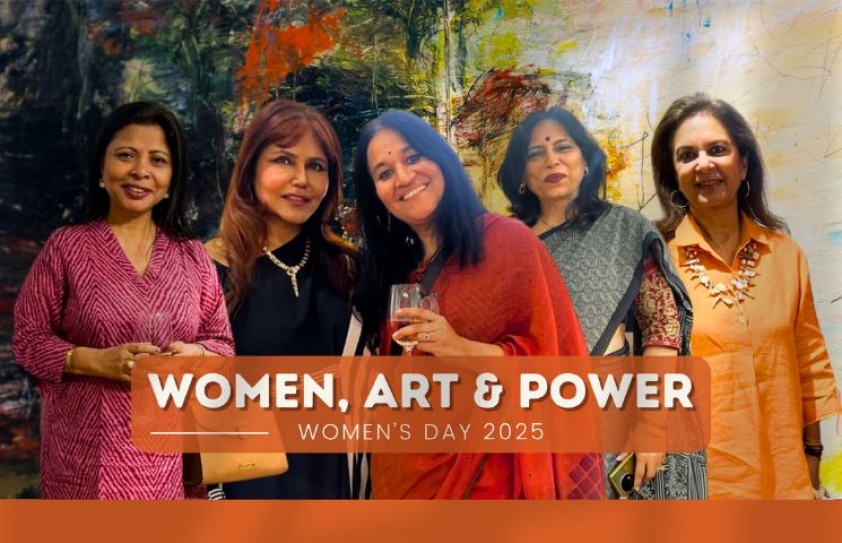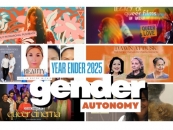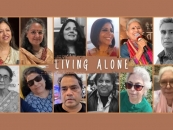
GENDER: CELEBRATING WOMEN, ART, AND POWER
by Vinta Nanda March 8 2025, 12:00 am Estimated Reading Time: 4 mins, 55 secsCelebrating the power of women in art, cinema and entrepreneurship, this International Women's Day highlights achievements, challenges, and the urgent need for gender equality in storytelling, finance, and social justice. Vinta Nanda writes…
International Women's Day 2025 celebrates women's empowerment across art, cinema, activism, and entrepreneurship. From breaking gender barriers to advocating for financial independence and social justice, women continue to reshape narratives. This feature covers Nisha JamVwal’s luxury event at Millaya, showcases feminist storytelling, art collaborations, and critical gender issues like the Hema Committee Report, #MeToo movement, and women's financial literacy. As debates over media bias, economic disparity, and gender justice intensify, women remain at the forefront of change, ensuring their voices are heard in policy, entertainment, and society.
Every year, International Women’s Day is a moment to pause, reflect, and celebrate the indomitable spirit of women across fields. From artists to activists, entrepreneurs to entertainers, women have consistently carved spaces for themselves in a world still fraught with challenges. In the heart of Mumbai, amid the city’s pulsating energy, one such celebration took place—a confluence of art, intellect, and the sheer power of womanhood.
Curated by Nisha JamVwal, celebrated art consultant, columnist, and the force behind one of India’s most successful luxury event and consulting firms, an exclusive wine sundowner at Millaya—a refined SoBo gallery by Gayatri Khanna—brought together some of the most distinguished minds in the country. It was a night of art, haute cuisine, and stimulating conversations, but more than that, it was an evening that highlighted the power of women supporting women.
44.jpg)
A Celebration of Women’s Achievements
The event saw an enviable guest list, featuring corporate head honchos, IAS officers, legal experts, filmmakers, architects, advertising stalwarts, and activists, all celebrating the essence of women’s empowerment and artistic brilliance. Among the esteemed guests were celebrity chef Shipra, author Nandita Puri, UK High Commissioner Harjinder Kang with his wife Kam, advertising veteran Sunil Alag, mentalist Deepak Rao, art impresario Gopika Dahanukar, philanthropist Dr. Manju Lodha, activist lawyer Abha Singh, filmmaker Tanuj Garg, and many more. The presence of consul generals Kobbi Shoshani, Don Donnawit, Kenko, and Shirani Ariyarathne, alongside industry experts such as Dr. Amit Karkhanis, Vinod Advani, Fin School Director Anna Hart, corporate leader Anand Jain, architect Anil Salian, and designer Aakif Habib, lifted the stature of the evening.
While the conversations meandered through various topics, what remained a constant thread was the recognition of women’s contributions across disciplines. From the corporate boardroom to the art world, the event showcased the brilliance of women who have paved the way for others.
Art as a Symbol of Women’s Strength
At the heart of the celebration was a spectacular art showcase at Millaya, featuring embroidered works by Gayatri Khanna’s atelier. The exhibit included masterpieces by celebrated artists Nikhil Chopra, Ranbir Kaleka, Manjunath Kamath, and Shaurya Kumar. These works, rendered in exquisite embroidered artistry, blurred the lines between fashion and fine art, offering a unique medium of storytelling.
Nisha JamVwal, in her address, highlighted the beauty of collaboration, especially between women. “Gaya and I have shared a passion for art and storytelling,” she said, referring fondly to Gayatri Khanna, the visionary behind Millaya. Their mutual admiration was evident as Gayatri acknowledged JamVwal’s efforts to champion the showcase, making it an unforgettable experience for the attendees.
Beyond Celebration: The Urgent Need for Change
While the evening was a tribute to achievements, it was also a subtle reminder of the battles women continue to fight. Women in India, particularly in creative and corporate spaces, often navigate a landscape riddled with gender biases, pay gaps, and societal expectations. Even as women break ceilings, the structures of patriarchy remain deeply embedded, making every success hard-won.
In recent discussions, filmmakers and activists have voiced concerns about gender justice. The Hema Committee Report shed light on the systemic abuse faced by women in the Malayalam film industry, mirroring challenges seen globally in Hollywood’s MeToo movement. Similarly, the Uttar Pradesh Women’s Commission’s proposal to ban male tailors from stitching women’s clothes is another example of misguided protectionism that does little to address deep-rooted gender biases.
The film industry, too, has witnessed its share of gender struggles. The controversy surrounding the certification and screenings of my film #SHOUT, which traced India’s feminist movement, stresses how women's voices continue to be suppressed by fear and establishment-driven control. Despite its powerful documentation of women's rights over five decades, the film remains in limbo due to apprehensions from its producers. This, in itself, is emblematic of how difficult it is for women’s stories to find mainstream acceptance.
Women and the Future of Storytelling
Documentary filmmaking, in particular, has become a powerful tool for women’s narratives. Films like Namrata Datta’s 'Lakshahira', which documents the life of a 94-year-old poet, lyricist, and singer from Northeast India, or my own much-contested film '#SHOUT' are vital in preserving women’s histories. As mainstream media increasingly politicizes and commercializes narratives, the responsibility of truth-telling falls on independent platforms and individuals.
Even in the corporate world, women face challenges of equity and recognition. Initiatives such as Neha Singh’s WOMENEYSTA, which aims to provide financial knowledge to women, emphasize the necessity of women achieving economic independence. Financial literacy is one of the most overlooked yet crucial aspects of empowerment, and platforms like these bridge that gap.
The gender divide is also reflected in social conversations. The media’s obsession with high-profile weddings and extravagant displays of wealth, starkly contrasts the everyday struggles of working women. The coverage of glamour often erases the voices of women fighting for basic rights, highlighting the urgent need for balanced narratives that address economic disparity and social justice.


41.jpg)



-173X130.jpg)




-173X130.jpg)
-173X130.jpg)
-173X130.jpg)